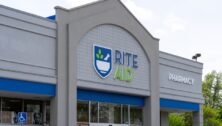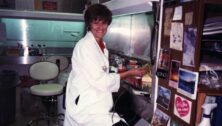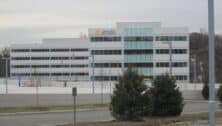Chester County Leadership: Christopher Molineaux, CEO of Pennsylvania Bio
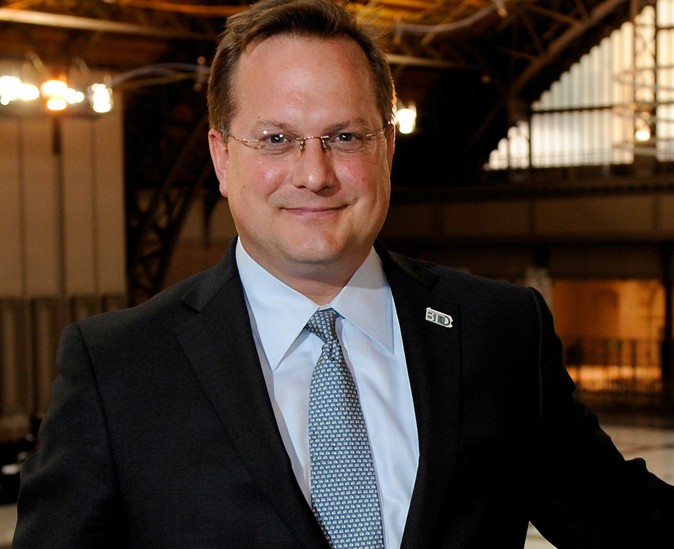
This evening Christopher Molineaux, CEO of Pennsylvania Bio, will welcome over 1,000 leaders and luminaries of Pennsylvania’s life sciences industry to his organization’s annual dinner at the Philadelphia Convention Center.
Wayne-based Pennsylvania Bio is the statewide trade association for the entire life sciences industry in the Commonwealth. The association has 13 employees and a Board of Directors of 39 people from across the state.
Leading such a large, diverse, geographically dispersed group is nothing new for Molineaux. Before joining Pennsylvania Bio, Chris served as Worldwide Vice President for Communications & Public Affairs for Johnson & Johnson’s Pharamaceuticals business.
VISTA Today spoke with Chris last week about growing up on Long Island and moving to the Boston suburbs when he was 15, running for class president in his sophomore year in a new high school and getting just one vote; his, landing a White House job working for then Vice President Bush the summer before his Senior year at Holy Cross, his approach to managing people with big egos and the strategic importance he places on treating people he meets with kindness and respect.
Where were you born Chris?
I was born in Queens, New York, the third of six children. I grew up in a village called Plandome in the town of Manhasset on Long Island. My dad was a lawyer, who at 85 years old, still practices law today and is pursuing a licentiate in Canon Law at Catholic University in Washington, DC.
My mother was a work-at-home mom. With six kids in the house, all born within a ten-year span, she had enough work to keep her busy and until we had all had graduated from college never considered a career outside the home. Today she is a top residential realtor in McLean, VA where my parents live.
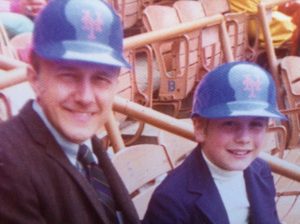
What do you remember about growing up in Plandome?
Plandome was a wonderful neighborhood with lots of large families. It was an open community and nobody worried about their children being out roaming around the neighborhood for hours.
There were many children my age around and we were always outside playing at someone’s house or on the village green. I had a lot of friends! In fact, two of my best friends in life to this day, are guys I met in Plandome when I was three or four years old.
Did your family stay in Plandome?
No. The summer between my Freshman and Sophomore years of high school, we moved to Dover, Massachusetts in the suburbs of Boston. . I thought at the time moving into a new neighborhood and school would be a big challenge for me…but turned out to present great opportunities.
How did you handle that transition?
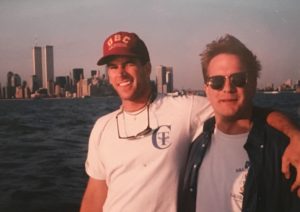
Growing up in a large family and having a lot of people around gave me some pretty good interpersonal skills. Those people skills allowed me to transition into a new all-boys Catholic high school pretty easily.
I can’t say I worked hard at making friends, rather making new friends just came naturally to me.
Within a couple of days of my start in the new school, I nominated myself for class president. I got one vote! By the end of the year when class elections came up again, I again put my name into the ring and came in second in a field of twelve candidates.
What made you take such a gutsy move stepping into an election process like that?
I don’t know. I just wanted to get to know my classmates and make friends and I assumed being in a position with some visibility might help. I was not the least bit surprised nor disappointed when I received just one vote; my own.
What sports did you do in high school?
I was on the swim team my Freshman year and on the football and baseball teams Sophomore, Junior and Senior years. I was a catcher on the baseball teams. In football, I began as a small cornerback but became a linebacker and wide receiver when a transferred to Roxbury Latin, a much smaller school, for Junior and Senior years. I didn’t get any bigger, rather my teammates got smaller.
What kind of jobs did you do when you were growing up?
I had all the jobs typical kids have growing up; I mowed lawns, shoveled snow and delivered papers. As I got into high school, I was a dishwasher at a restaurant and progressed into waiting tables. I had a job as a lifeguard for a couple of summers.
What did you learn from those jobs that stay with you today?
I developed a service mentality waiting tables and washing dishes. I’m a firm believer that everyone should spend time washing dishes in a restaurant kitchen and serving meals to restaurant patrons at some point of their lives.
Why did you choose to attend Holy Cross for college?
My parents and I were big believers in Catholic education and looked at Georgetown, Villanova, Boston College, and Holy Cross. Holly Cross was nearby, a good school, and six of my graduating high school class of forty-seven boys decided to attend Holy Cross. I went with them.
Was College of the Holy Cross a good choice for you?
Yes, although looking back I wish the school had offered more diverse educational opportunities at the time. Holy Cross is well known for high standards in the liberal arts, but it was a small, fairly insular environment. Later I also wished Holy Cross had higher name recognition outside the Northeast. When I started my career in Washington, D.C., very few people had ever heard of the College of the Holy Cross. Many thought I was referring to a high school.
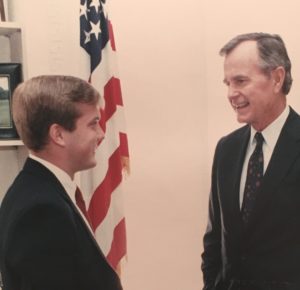
What job did you have in Washington?
The summer of 1986, after my junior year in college, I had an internship working in the White House. My father was co-chair of New York’s Young Republicans Club when we lived on Long Island. The wife of his co-chair worked in the Comments Office at the White House in the Reagan Administration.
The Comments Office, in the basement of the Old Executive Office Building on the White House grounds, fielded calls from around the country providing feedback on President Reagan’s performance and policies. I sat in a big room in the basement with a lot of other volunteers, mostly retired women, recording voter feedback and checking off in-bound polling boxes on forms they gave us.
Were you a volunteer too?
I was. But unlike my coworkers, I could not afford to be a volunteer. For the first two weeks I was there I left the office every day at 4:00 PM trying to find a paying job waiting tables or washing dishes I could do at night. The internship involved moving from job to job in different offices around the White House. Eventually, the Scheduling Office of then-Vice President George H. W. Bush heard that I was a good intern and that I was looking for a paying job and they hired me for a paid intern position.
Was that your first big career break?
It was, and I have to give the credit to Debbie Hutton, who has since passed away. Debbie gave me my first big break by hiring me as a twenty-year-old into the Vice President’s scheduling office. Her decision made it easier for me to focus all day on my White House job. That job exposed me to the rest of the Vice President’s office – the Chief of Staff, the policy people, the people in the Advance Office; the entire network of people working for the Vice President.
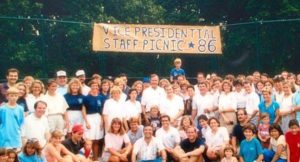
How did you do in the new position?
At the end of the Summer, the Vice President’s Advance Office asked me to plan the Vice President’s staff picnic. Putting on a picnic is not a big deal, except when it’s for the Vice President of the United States.
I did everything for the event including ordering the food and personally painting the banner that hung behind the backstop of the softball field. I rolled out a huge roll of butcher paper in the basement of the Old Executive Office Building and painted a banner that served as the backdrop to the vice presidential event.
What did they see in you, Chris?
There are a couple of attributes that benefited me and are universal in their importance. Since I was a History major in college, I‘ve always been an effective communicator and a pretty good writer. The other thing I think they saw in me were my interpersonal skills. I had attended three different high schools. This forced me to be outgoing and meet new people.
The fact I was willing to take on any job was a big difference as well. I was always happy to advance the trips to exotic and glamorous foreign countries. And I also always accepted the not-so-glamorous trips to places like Biloxi, Mississippi; Mobile, Alabama; and Davenport, Iowa in January. They knew they could rely on me to be available.
In that White House job and in your position at Pennsylvania Bio you deal with people with big egos and paychecks. What’s your secret?
It sounds cliché, but putting myself in their position and understanding what they’re trying to accomplish, without exposing them or the situation, is key. None of us is more important than anyone else. I’ve been reprimanded by a lot of bosses in my life, including the President of the United States. If I get into a disagreement with a member of Pennsylvania Bio or anyone I meet, I frequently remind myself I’ve been yelled at by more important people than them!
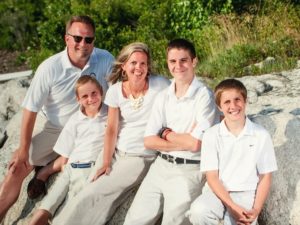
Looking at this New Year Chris, what are Pennsylvania Bio’s challenges and opportunities?
The greatest opportunity we have is to continue to broaden the network of Pennsylvania Bio and expand the influence we can have on public policy and the business environment on behalf of our members.
Our membership includes not just biotech but pharma companies, medical device developers, makers of diagnostics, healthcare IT and digital health companies, the academic research community, investors and all the service providers who support the life-sciences industry.
We ended 2015 with 674 member companies, which makes us the second largest biotech industry trade group in the country behind only California’s trade group.
Because of this growth and the diverse membership we now enjoy we are currently in the process of determining what our brand should be moving forward. We are well beyond our biotech roots of 26 years ago. In this case, we are looking at brand in the true sense of the word, not just our logo and name. We want to understand how best to define ourselves as an organization…what we do and who we serve.
Managing and monitoring the different challenges our members face every day remains a challenge. The life sciences industry is one of the fastest evolving industries and has been for decades. The rapid pace of change gives us something new to pursue every day.
Membership in PA Bio is voluntary; Companies are not forced to join. We are a service organization and, as such, we have to bring value every day to our members or we risk losing them. In the six years I’ve been CEO, we have grown from 348 member companies to 674 at the end of last year and 681 member companies as of this week.
And PA Bio is a statewide organization, right?
That’s correct. While the heaviest concentration is in the southeast part of the state, we have a heavy presence in Pittsburgh, the center part of the state, 30 companies in the Lehigh Valley. We even have 35 member companies who aren’t even based in Pennsylvania.
Its clear, you’re on a roll.
I love my job! I’ve been in the healthcare and life sciences arena for 26 years. I love the companies and the people I get to work with in our member companies. I would also argue the staff at Pennsylvania Bio is the best team the organization has ever had.
What is the best piece of advice you ever received Chris?
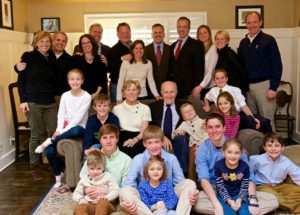
There are three. First, the wonderful example my mother and her sense of humor set for me. Our home was always a light and happy place filled with humor. Usually corny humor, but clean and intellectual humor that has always helped me keep things in perspective. You have to be able to laugh at mistakes and problems – learn from them, for sure. But don’t dwell on them.
The second comes from my father, my hero and life coach: Exercise your brain and body. But most of all, exercise your soul. Remember, you know not the day nor the hour…
Finally, the best leadership advice I’ve received came from Bill Pierce, a guy who worked with me at the Blue Cross Blue Shield Association many years ago. He told me always to remember…as you climb in your career there is only one person who actually holds all the keys to the C-Suite: it’s the janitor. Everyone, no matter their position in the company or life, deserves kindness and respect. I try to live that in every job I have.
After Vice President Bush beat Governor Dukakis in 1988, I was hired as an advance representative in the Bush Administration. In that position, I traveled to 48 states and fourteen foreign countries.
Everywhere I went, interacting with the Soviets, doing the press advance for Emperor Hirohito’s funeral, having lunch with Lech Walensa at his home in Gdansk, the importance of being kind and respectful to people was always with me. I’ve seen the consequences of not being kind and respectful. You don’t get asked back, or you don’t make that critical connection needed to get to the next spot on your career ladder.
Connect With Your Community
Subscribe to stay informed!
"*" indicates required fields









![95000-1023_ACJ_BannerAd[1]](https://vista.today/wp-content/uploads/2023/03/95000-1023_ACJ_BannerAd1.jpg)



































